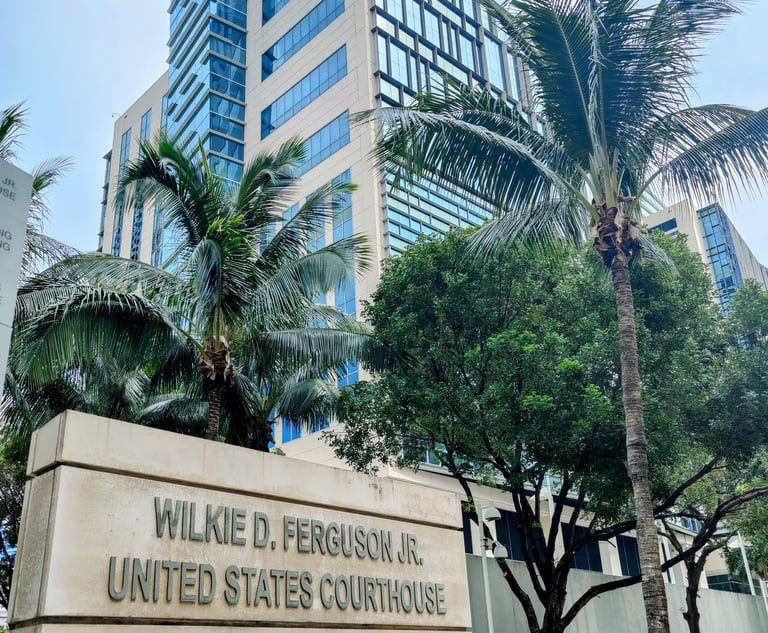DeSantis Administration Fights Medical Marijuana Ruling for Florigrown
The Florida Department of Health is challenging a July appellate decision that found a state law requiring medical marijuana operators to grow, process and sell cannabis and derivative products runs afoul of a constitutional amendment that broadly legalized medical marijuana.
December 11, 2019 at 01:28 PM
6 minute read
 Outdoor cannabis cultivation. Credit: Yarygin/Shutterstock.com
Outdoor cannabis cultivation. Credit: Yarygin/Shutterstock.com
Calling a Tampa company's effort to get a medical marijuana license a "stunt," Gov. Ron DeSantis' administration is asking the Florida Supreme Court to reject an appeals court ruling that could upend the state's medical cannabis industry.
The Florida Department of Health is challenging a July appellate decision that found a state law requiring medical marijuana operators to grow, process and sell cannabis and derivative products, a system known as "vertical integration," runs afoul of a constitutional amendment that broadly legalized medical marijuana.
The department went to the Supreme Court in a lawsuit filed by Florigrown, a company owned in part by strip-club operator Joe Redner. The company filed the case after state health officials rejected its request for a medical marijuana license shortly after the constitutional amendment went into effect in 2017.
Leon County Circuit Judge Charles Dodson last year ordered state health officials to begin registering Florigrown and other medical marijuana firms to do business, but his order has been on hold since the state appealed.
In July, the First District Court of Appeal upheld in part Dodson's ruling that found the state's vertical integration system conflicted with the constitutional amendment, approved by more than 70% of voters in 2016.
DeSantis appealed that decision, and the Florida Supreme Court agreed to take up the case.
In an initial brief filed last week, lawyers representing DeSantis and health officials argued that the appellate court was wrong to uphold the temporary injunction ordered by Dodson.
The state's introduction to the 54-page brief chastises Redner and his partner, Adam Elend, saying they had "no revenue, significant assets, or relevant industry experience" when Florigrown applied for a medical marijuana license.
"The company … is run by a web video producer and owned by Joe Redner, neither of whom are botanists, pharmacists, physicians or have any professional experience or credentials in the medical field," the state's lawyers wrote.
Florigrown sought to "register" itself as a medical marijuana operator by sending a letter to state health officials two weeks after the constitutional amendment went into effect, the state explained.
"This stunt, which makes a mockery of all legal and regulatory procedures related to" the constitutional amendment "has resulted in the case now before this court," the state's lawyers argued.
The temporary injunction hinges on language in a state law, passed in 2017 as the Legislature carried out the constitutional amendment.
Under the law, the vertical integration system requires operators, dubbed "medical marijuana treatment centers," to handle all aspects of the cannabis trade. Critics of vertical integration contend that it shuts out firms that could perform individual aspects of the marijuana business.
The statute also says medical marijuana treatment centers "shall cultivate, process, transport, and dispense marijuana for medical use," while the amendment says a medical marijuana treatment center is an entity that "acquires, cultivates, possesses, processes … transfers, transports, sells, distributes, dispenses, or administers" medical marijuana.
The law requires entities to "conform to a more restricted definition" than is provided in the amendment, the majority in the 2-1 appellate court decision said this summer.
In a concurring opinion, Judge Scott Makar accused the Legislature of "rewriting clear language in the Constitution" by "transforming a disjunctive 'or' into a conjunctive 'and.' "
The appeals court agreed to ask the Supreme Court to weigh in on whether the vertical integration system and a cap on the number of marijuana licenses included in the state law "are in direct conflict" with the constitutional amendment.
In the brief filed last week, the state's lawyers argued "nothing in the amendment alters the Legislature's power to make policy decisions related to the regulatory oversight of medical marijuana in Florida."
The Legislature was acting within its authority "when it created a broad regulatory scheme to implement the amendment, including regulations for the licensing and structure of MMTCs," the lawyers wrote, using the acronym for medical marijuana treatment centers.
"Indeed, the amendment itself contemplates legislative action," they added.
The appellate court "overlooked the Legislature's broad lawmaking authority" when evaluating Florigrown's challenge, the state's lawyers wrote, arguing that Florigrown does not have a substantial likelihood of success on the merits of the case.
The constitutional amendment "is silent" as to the number of operators that may be registered in the state or whether the medical marijuana treatment centers should be horizontally or vertically integrated, the state's lawyers argued.
"Most importantly, nothing in the amendment expressly prohibits the Legislature from making policy decisions on those two points," they added.
The state also tried to persuade the Supreme Court to uphold the cap on the number of medical marijuana operators included in the law.
The cap on licenses "ensures adequate oversight of a burgeoning industry," the DeSantis administration lawyers argued.
The limit on the licenses was also designed to ensure that medical marijuana "would not be diverted to other states where it remains illegal, that it would not be diverted to minors" and that operators would not use medical marijuana "as a pretext … for other illegal activities," the state's lawyers wrote.
"Steady expansion, commensurate with need, also fulfills the amendment's purpose of giving patients access to the safe use of medical marijuana," they argued.
Doing away with the cap on the number of medical marijuana operators in Florida would almost certainly cause the value of existing licenses, which have sold for upward of $50 million, to plummet.
The state's lawyers also argued that Dodson's ruling and the subsequent appellate court decision "injected confusion and uncertainty" into the registration process for medical marijuana vendors and "attempts to radically alter the status quo."
DeSantis' administration is asking the Supreme Court to send the case back to Dodson and tell the circuit judge to deny Florigrown's motion for a temporary injunction.
Dara Kam reports for the News Service of Florida.
This content has been archived. It is available through our partners, LexisNexis® and Bloomberg Law.
To view this content, please continue to their sites.
Not a Lexis Subscriber?
Subscribe Now
Not a Bloomberg Law Subscriber?
Subscribe Now
NOT FOR REPRINT
© 2025 ALM Global, LLC, All Rights Reserved. Request academic re-use from www.copyright.com. All other uses, submit a request to [email protected]. For more information visit Asset & Logo Licensing.
You Might Like
View All
'Close Our Borders?' Senate Judiciary Committee Examines Economics, Legal Predicate for Mass Deportation Proposal
3 minute read

'Stab Venequip in the Back': Caterpillar Faces $100M Lawsuit in Miami Federal Court
3 minute read
Another Roundup Trial Kicks Off in Missouri. Monsanto Faces 3 Plaintiffs
4 minute readTrending Stories
- 1Bribery Case Against Former Lt. Gov. Brian Benjamin Is Dropped
- 2‘Extremely Disturbing’: AI Firms Face Class Action by ‘Taskers’ Exposed to Traumatic Content
- 3State Appeals Court Revives BraunHagey Lawsuit Alleging $4.2M Unlawful Wire to China
- 4Invoking Trump, AG Bonta Reminds Lawyers of Duties to Noncitizens in Plea Dealing
- 522-Count Indictment Is Just the Start of SCOTUSBlog Atty's Legal Problems, Experts Say
Who Got The Work
J. Brugh Lower of Gibbons has entered an appearance for industrial equipment supplier Devco Corporation in a pending trademark infringement lawsuit. The suit, accusing the defendant of selling knock-off Graco products, was filed Dec. 18 in New Jersey District Court by Rivkin Radler on behalf of Graco Inc. and Graco Minnesota. The case, assigned to U.S. District Judge Zahid N. Quraishi, is 3:24-cv-11294, Graco Inc. et al v. Devco Corporation.
Who Got The Work
Rebecca Maller-Stein and Kent A. Yalowitz of Arnold & Porter Kaye Scholer have entered their appearances for Hanaco Venture Capital and its executives, Lior Prosor and David Frankel, in a pending securities lawsuit. The action, filed on Dec. 24 in New York Southern District Court by Zell, Aron & Co. on behalf of Goldeneye Advisors, accuses the defendants of negligently and fraudulently managing the plaintiff's $1 million investment. The case, assigned to U.S. District Judge Vernon S. Broderick, is 1:24-cv-09918, Goldeneye Advisors, LLC v. Hanaco Venture Capital, Ltd. et al.
Who Got The Work
Attorneys from A&O Shearman has stepped in as defense counsel for Toronto-Dominion Bank and other defendants in a pending securities class action. The suit, filed Dec. 11 in New York Southern District Court by Bleichmar Fonti & Auld, accuses the defendants of concealing the bank's 'pervasive' deficiencies in regards to its compliance with the Bank Secrecy Act and the quality of its anti-money laundering controls. The case, assigned to U.S. District Judge Arun Subramanian, is 1:24-cv-09445, Gonzalez v. The Toronto-Dominion Bank et al.
Who Got The Work
Crown Castle International, a Pennsylvania company providing shared communications infrastructure, has turned to Luke D. Wolf of Gordon Rees Scully Mansukhani to fend off a pending breach-of-contract lawsuit. The court action, filed Nov. 25 in Michigan Eastern District Court by Hooper Hathaway PC on behalf of The Town Residences LLC, accuses Crown Castle of failing to transfer approximately $30,000 in utility payments from T-Mobile in breach of a roof-top lease and assignment agreement. The case, assigned to U.S. District Judge Susan K. Declercq, is 2:24-cv-13131, The Town Residences LLC v. T-Mobile US, Inc. et al.
Who Got The Work
Wilfred P. Coronato and Daniel M. Schwartz of McCarter & English have stepped in as defense counsel to Electrolux Home Products Inc. in a pending product liability lawsuit. The court action, filed Nov. 26 in New York Eastern District Court by Poulos Lopiccolo PC and Nagel Rice LLP on behalf of David Stern, alleges that the defendant's refrigerators’ drawers and shelving repeatedly break and fall apart within months after purchase. The case, assigned to U.S. District Judge Joan M. Azrack, is 2:24-cv-08204, Stern v. Electrolux Home Products, Inc.
Featured Firms
Law Offices of Gary Martin Hays & Associates, P.C.
(470) 294-1674
Law Offices of Mark E. Salomone
(857) 444-6468
Smith & Hassler
(713) 739-1250






